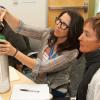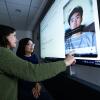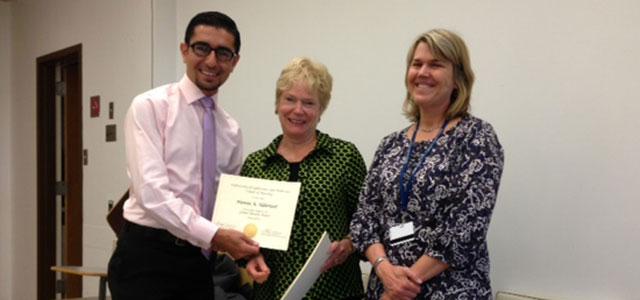
Sally Rankin (center) and Lisa Thompson present a global health minor certificate to Hamza Alduraidi. See PROFILES below to read his story and that of current student Rebecca Sedillo.
Global Health Minor Aims to Bridge Gap Between Passion and Experience for Nursing Students
When nurse researcher Lisa Thompson began her career in global health, it was, in her words, “by the seat of my pants.”
As a nursing master’s student at San Francisco State University in the 1990s, she knew she wanted to do global health research, but opportunities to work abroad were difficult to come by. There was little training available for working and conducting health research in developing countries like Peru, where Thompson ultimately did her master’s research project on issues surrounding women’s health in both rural and urban communities.
Growing Interest Fuels Demand for Global Health Education
Interest in global health has increased dramatically since Thompson – now an assistant professor in the Department of Family Health Care Nursing and on faculty at UC San Francisco’s Global Health Sciences – began her career. That’s why in 2011, in response to student demand, UC San Francisco School of Nursing created a minor in global health, which allows its students to get an in-depth look at issues that affect the health of populations across the globe and prepares them to work as clinicians, researchers and leaders in health care at the international level.
In part, the minor came about as a result of experiences Sally Rankin had taking groups of students and faculty to Malawi, where she has been conducting research since 2001. The School’s associate dean for Global Health and International Programs and an internationally recognized leader in global health nursing, Rankin was leery of giving students a “medical tourism” perspective, given that students usually only have the summer weeks to participate in global health projects. “We wanted our students to be involved in a meaningful way,” she says. “It’s difficult for them to go in for a summer and get a lot out of the experience without being very well prepared.”
Rankin and her colleagues looked for ways to provide more training for students interested in global health. One option was to allow them to take courses offered through UC San Francisco’s Global Health Sciences program, a one-year master’s program open to students across disciplines. The program, however, had very limited space, and while several PhD nursing students were able to take some courses, it became clear that the School of Nursing would have to offer their own program in order to meet the growing demand for global health education.
Training Students in the Clinical and Cultural Aspects of Global Health
The global health minor requires master’s and PhD students in any of the School’s departments to complete a series of required and elective courses over a two-year period. Courses run the gamut from examining health policy and comparative health systems and looking at global and local health disparities, to clinically oriented classes like caring for HIV/AIDS patients or providing primary care to farmworkers. Among the most popular electives are classes in infectious diseases, noncommunicable diseases and women’s health.
Regardless of the topic, much of the focus across classes has to do with the challenges of working in settings where access to care is limited and where priorities may differ from what students have come to expect. As Thompson (who co-teaches the women’s health course with Ellen Scarr) says, “It can be completely different from the US context. We have to look at things like access to family planning and why that’s important in places where there’s a lot of maternal morbidity and mortality. We have to ask whether people want family planning, and if so, why can’t they get it?”
The minor also offers an elective course that addresses practicalities that can befuddle the inexperienced or unprepared – things like figuring out how to stay safe, how to physically prepare for work in unstable or low-resource regions, what kinds of vaccinations to get and medications to bring, or what to do if you get sick or are exposed to infectious disease while working abroad.
Equally important, the course looks at some of the social and cultural challenges of working in low- or middle-income countries. “It can be very disillusioning to find that health care providers cut corners or aren’t being held to the same level of responsibility that ours are,” says Rankin. “We talk about what it means to be a sensitive provider in a country that’s not at all like the US and what it’s like to work side by side with nurses who have to make do with very little.”
Creating a Global Health Community
In the nearly three years since its inception, the global health minor has proved popular. According to Rankin, there are about 30 nursing and sociology students enrolled from across specialties, and demand is growing. Both she and Thompson attribute this popularity in part to a growing recognition of the ways in which the world is interconnected and the desire to both learn from others and lessen the impact of health disparities. “I think there are a lot of people in the generation coming into graduate school who are very altruistic and believe it’s the right thing to do,” says Rankin.
As the minor evolves, faculty are trying to create more long-term clinical and research opportunities in different parts of the world, to bridge the gap between passion and experience for students of global health and to connect them with clinicians and researchers on the ground to form collaborations that will benefit everyone. Says Thompson, “We’re really trying to create a global health community of nurses.”
PROFILES
Hamza Alduraidi: Nursing Locally and Globally
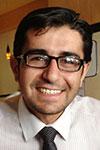 Hamza Alduraidi Hamza Alduraidi’s global health story started before he left his native Jordan.
Hamza Alduraidi Hamza Alduraidi’s global health story started before he left his native Jordan.
A recent graduate of UC San Francisco School of Nursing’s master’s program in Advanced Practice Public Health Nursing and its global health minor, Alduraidi began his nursing career in Jordan’s refugee camps in 2008. His interest in refugee health was sparked by his mother’s experiences as a Palestinian refugee since the Arab-Israeli war of 1948 and by the plight of the 2 million Palestinian refugees living in Jordan – many of whom suffer from the effects of overcrowding and poverty born of generations spent in camps originally built as a temporary measure more than 60 years ago.
In 2011, when the University of Jordan was seeking more nursing faculty, it offered Alduraidi a scholarship to pursue a master’s and PhD in public health nursing at a school of his choosing. He decided on UCSF. “It was very attractive to me because I was interested in studying the phenomenon of refugees from the perspective of global and community health and public health nursing,” he says. “Faculty members’ expertise and research interests were amazingly attractive as well.”
One of the most interesting aspects of his studies, he says, was the opportunity to look at what was to him a local phenomenon – the health of Palestinian camp refugees in Jordan – from a global perspective, discussing literature written largely for American or European researchers with colleagues who had never been in a refugee camp. “It really gave me the feeling of studying it from the outside,” he says. “You have to look at it with a degree of abstraction, to see it as a nurse who is both from everywhere and nowhere, interested in advancing the health of people wherever they are.”
Alduraidi began his PhD at the School of Nursing this fall and is planning his dissertation on the health of refugees from a global perspective.
Rebecca Sedillo: HIV/AIDS, Africa and Palliative Care
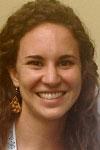 Rebecca Sedillo An undergraduate course on HIV/AIDS in Africa inspired Rebecca Sedillo, a student in the Master’s Entry Program in Nursing (MEPN) who is pursuing both the global health and HIV minors, to go into nursing.
Rebecca Sedillo An undergraduate course on HIV/AIDS in Africa inspired Rebecca Sedillo, a student in the Master’s Entry Program in Nursing (MEPN) who is pursuing both the global health and HIV minors, to go into nursing.
“My professor was an HIV/AIDS researcher from Makerere University, in Uganda. She opened my eyes to the epidemic and the intersection of health care with all sorts of psychosocial and political issues that intersect with chronic health conditions, especially HIV,” says Sedillo. After spending part of her senior year volunteering with the professor in Uganda, Sedillo set her sights on becoming a nurse practitioner.
Prior to beginning her nursing education, she went to rural western Kenya to volunteer as a caregiver in a new inpatient hospice. The time there inspired her to consider specializing in palliative care.
She chose UCSF because of its commitment to HIV work and global health, and has since garnered more on-the-ground experience in low-resource areas, working in Nigeria on a USAID program to prevent mother-to-child transmission of HIV.
Sedillo is also interested in the potential nursing has for addressing the health care worker shortage in the US and, especially, in the developing world. “We [as nurses] rarely get a seat at the table in conversations about global health, and I see UCSF taking the role of the nurse seriously in those conversations,” she says. “I’m starting to think critically about the research and why global health could use nursing, and how to bring them together.”
To that end, Sedillo is participating in UC San Francisco’s interdisciplinary Global Health Sciences Clinical Scholars Program. She has received the Global Health Clinical Scholars Project Grant from UCSF’s Resource Allocation Program for Trainees to do a needs assessment project to adapt a UCSF outpatient palliative care model to a rural outpatient clinic in western Kenya.

